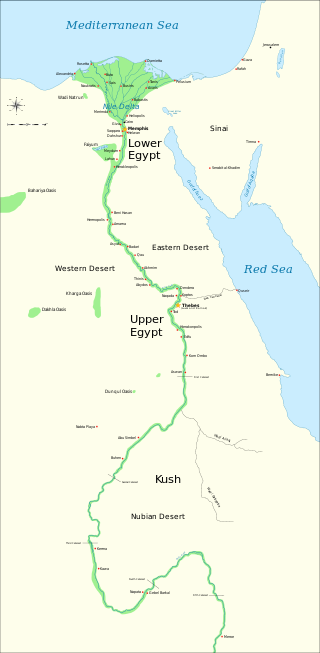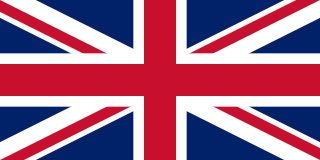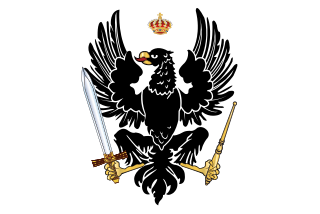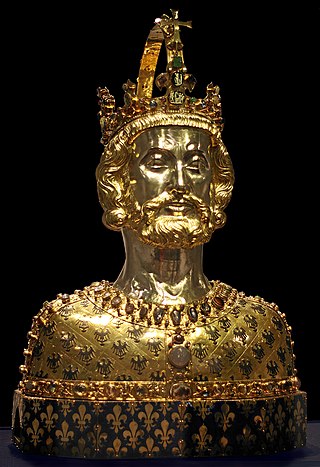Related Research Articles

Ancient Egypt was a civilization of ancient Northeast Africa. It was concentrated along the lower reaches of the Nile River, situated in the place that is now the country Egypt. Ancient Egyptian civilization followed prehistoric Egypt and coalesced around 3100 BC with the political unification of Upper and Lower Egypt under Menes. The history of ancient Egypt unfolded as a series of stable kingdoms interspersed by periods of relative instability known as "Intermediate Periods". The various kingdoms fall into one of three categories: the Old Kingdom of the Early Bronze Age, the Middle Kingdom of the Middle Bronze Age, or the New Kingdom of the Late Bronze Age.

Constitutional monarchy, also known as limited monarchy, parliamentary monarchy or democratic monarchy, is a form of monarchy in which the monarch exercises their authority in accordance with a constitution and is not alone in making decisions. Constitutional monarchies differ from absolute monarchies in that they are bound to exercise powers and authorities within limits prescribed by an established legal framework.

England is a country that is part of the United Kingdom. It is located on the island of Great Britain, of which it covers approximately 62%, and over 100 smaller adjacent islands. It has land borders with Scotland to the north and Wales to the west, and is otherwise surrounded by the North Sea to the east, the English Channel to the south, the Celtic Sea to the south-west, and the Irish Sea to the west. Continental Europe lies to the south-east, and Ireland to the west. At the 2021 census, the population was 56,490,048. London is both the largest city and the capital.

The Parliament of the United Kingdom of Great Britain and Northern Ireland is the supreme legislative body of the United Kingdom, and may also legislate for the Crown Dependencies and the British Overseas Territories. It meets at the Palace of Westminster in London. Parliament possesses legislative supremacy and thereby holds ultimate power over all other political bodies in the United Kingdom and the Overseas Territories. While Parliament is bicameral, it has three parts: the sovereign, the House of Lords, and the House of Commons. The three parts acting together to legislate may be described as the King-in-Parliament. The Crown normally acts on the advice of the prime minister, and the powers of the House of Lords are limited to only delaying legislation; thus power is de facto vested in the House of Commons.

The prime minister of the United Kingdom is the head of government of the United Kingdom. The prime minister advises the sovereign on the exercise of much of the royal prerogative, chairs the Cabinet and selects its ministers. As modern prime ministers hold office by virtue of their ability to command the confidence of the House of Commons, they sit as members of Parliament. The current prime minister is Rishi Sunak of the Conservative Party, who assumed the office on 25 October 2022.

The United Kingdom of Great Britain and Northern Ireland, commonly known as the United Kingdom (UK) or Britain, is a country in Northwestern Europe, off the coast of the continental mainland. It comprises England, Scotland, Wales, and Northern Ireland. The UK includes the island of Great Britain, the north-eastern part of the island of Ireland, and most of the smaller islands within the British Isles. Northern Ireland shares a land border with the Republic of Ireland; otherwise, the United Kingdom is surrounded by the Atlantic Ocean, the North Sea, the English Channel, the Celtic Sea, and the Irish Sea. The total area of the United Kingdom is 94,354 square miles (244,376 km2), with an estimated population of nearly 67.6 million people in 2022.

The monarchy of the United Kingdom, commonly referred to as the British monarchy, is the form of government used by the United Kingdom by which a hereditary monarch reigns as the head of state, with their powers regulated by the British Constitution. The term may also refer to the role of the royal family within the UK's broader political structure. The current monarch is King Charles III, who ascended the throne on 8 September 2022, upon the death of his mother, Queen Elizabeth II.

In biology, a kingdom is the second highest taxonomic rank, just below domain. Kingdoms are divided into smaller groups called phyla.

The British Overseas Territories (BOTs) are the 14 territories with a constitutional and historical link with the United Kingdom that, while not forming part of the United Kingdom itself, are part of its sovereign territory. The permanently inhabited territories are delegated varying degrees of internal self-governance, with the United Kingdom retaining responsibility for defence, foreign relations and internal security, and ultimate responsibility for good governance. Three of the territories are chiefly or only inhabited by military or scientific personnel, the rest hosting significant civilian populations. All fourteen have the British monarch as head of state. These UK government responsibilities are assigned to various departments of the Foreign, Commonwealth and Development Office and are subject to change.

The Kingdom of Prussia constituted the German state of Prussia between 1701 and 1918. It was the driving force behind the unification of Germany in 1866 and was the leading state of the German Empire until its dissolution in 1918. Although it took its name from the region called Prussia, it was based in the Margraviate of Brandenburg. Its capital was Berlin.

The Kingdom of England was a sovereign state on the island of Great Britain from the early 10th century, when it emerged from various Anglo-Saxon kingdoms, until 1 May 1707, when it united with Scotland to form the Kingdom of Great Britain, which would later become the United Kingdom. The Kingdom of England was among the most powerful states in Europe during the medieval and early modern colonial periods.

The Habsburg monarchy, also known as Habsburg Empire, or Habsburg Realm, was the collection of empires, kingdoms, duchies, counties and other polities that were ruled by the House of Habsburg. From the 18th century it is also referred to as the Danubian monarchy or the Austrian monarchy.

The Parliament of the United Kingdom currently has 650 parliamentary constituencies across the constituent countries, each electing a single member of parliament (MP) to the House of Commons by the plurality voting system, ordinarily every five years. Voting last took place in all 650 of those constituencies at the United Kingdom general election on 12 December 2019.

Kingdom Hearts is a series of action role-playing games created by Japanese game designers Tetsuya Nomura and Shinji Hashimoto, being developed and published by Square Enix. It is a collaboration between Square Enix and The Walt Disney Company, and is under the leadership of Nomura, a longtime Square Enix employee.

The Kingdom of Portugal was a monarchy in the western Iberian Peninsula and the predecessor of the modern Portuguese Republic. Existing to various extents between 1139 and 1910, it was also known as the Kingdom of Portugal and the Algarves after 1415, and as the United Kingdom of Portugal, Brazil and the Algarves between 1815 and 1822. The name is also often applied to the Portuguese Empire, the realm's overseas colonies.

Great Britain is an island in the North Atlantic Ocean off the north-west coast of continental Europe, consisting of the countries England, Scotland and Wales. With an area of 209,331 km2 (80,823 sq mi), it is the largest of the British Isles, the largest European island and the ninth-largest island in the world. It is dominated by a maritime climate with narrow temperature differences between seasons. The island of Ireland, with an area 40 per cent that of Great Britain, is to the west—these islands, along with over 1,000 smaller surrounding islands and named substantial rocks, form the British Isles archipelago.

Since 1922, the United Kingdom has been made up of four countries: England, Scotland, Wales and Northern Ireland. The UK Prime Minister's website has used the phrase "countries within a country" to describe the United Kingdom.

The Kingdom of the Netherlands, commonly known simply as the Netherlands, is a sovereign state consisting of a collection of constituent territories united under the monarch of the Netherlands, who functions as head of state. The realm is not a federation; it is a unitary monarchy with its largest subdivision, the eponymous Netherlands, predominantly located in Northwestern Europe and with several smaller island territories located in the Caribbean.

King is the title given to a male monarch in a variety of contexts. A king is an absolute monarch if he holds the powers of government without control, or the entire sovereignty over a nation; he is a limited monarch if his power is restrained by fixed laws; and he is an absolute, when he holds the whole legislative, judicial, and executive power, or when the legislative or judicial powers, or both, are vested in other people by the king. Kings are hereditary sovereigns when they hold the powers of government by right of birth or inheritance, and elective when raised to the throne by choice.
References
- ↑ Childs, Gladwyn M. (1964). "The Kingdom of Wambu (Huambo): A Tentative Chronology". The Journal of African History. 5 (3). Cambridge University Press: 367–379. doi:10.1017/S0021853700005077. JSTOR 179973.